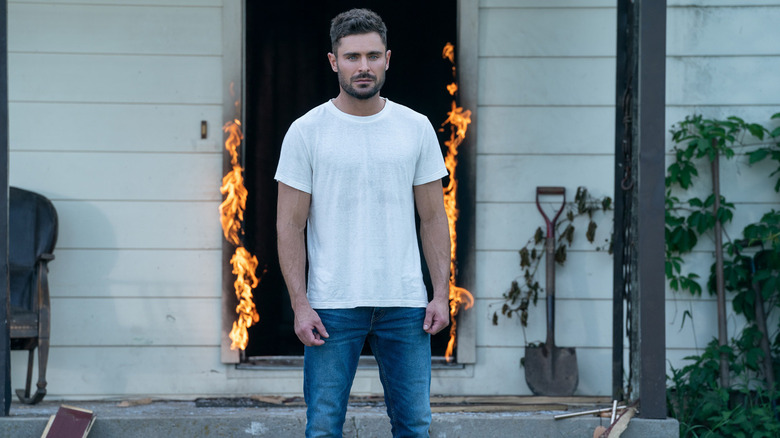2022's Firestarter Changed Andy In A Way Stephen King Wishes He Had Thought Of
Stephen King wrote his conspiracy thriller "Firestarter" in 1980, and it lodged itself in the mass consciousness. The novel was about a shadowy government organization called the Shop that was injecting volunteers with a mysterious drug called Lot 6. The drug imbued subjects with eerie psychic powers. The book's protagonist, Andy, was able to invade people's minds and "push" them into doing his will.
Andy fled the Shop with his telekinetic wife, went into hiding, and had a daughter named Charlie. Charlie was born with the psychic ability to start fires with her mind. For years, Shop agents are on their tail, including an unbalanced, obsessed assassin named Rainbird. As one might predict, the story ends in a fiery conflagration between Charlie and a battalion of tanks.
"Firestarter" was first adapted to film in 1984 by director Mark L. Lester. A young Drew Barrymore played Charlie, David Keith played Andy, and George C. Scott played Rainbird. The film wasn't a huge success, but it became reasonably well-liked among fans of Stephen King adaptations.
In 2022, "Firestarter" was re-adapted into a bleak, more conspiracy-focused horror flick, starring Ryan Kiera Armstrong as Charlie, and Zac Efron as Andy. Michael Greyeyes played Rainbird. It also wasn't super-successful, and it received abysmal reviews.
In King's story and in the 1984 adaptation, Andy typically used his "pushing" powers defensively, using them to aggressively take what he might want, or force attackers to do harm to themselves. This is a fine conceit for an action-packed superhero story, but King felt that it might make Andy seem a little cruel. In 2022, however, King spoke with Vanity Fair, and he admitted that the 2022 adaptation added a character trait to Andy that he approved of: Andy, briefly, used his powers for good.
Andy uses his powers for good in Firestarter
In the 2022 version of "Firestarter," Andy isn't merely on the lam, but has taken a job as a freelance addiction counselor. Even though Andy can influence people psychically, he's not running around forcing people to be his mental slaves or give him money. Instead, he's benevolently reaching into the minds of addicts and unmooring their mental dependence on substances. King liked that change, and felt it was an improvement on his original work. The author said:
"Sometimes movie people think up things and you say, 'I wish I had done that.' In this movie, Andy becomes a kind of a counselor to try to talk people out of their bad habits. And he does it by 'pushing' them. There's a woman at the beginning who's a smoker and he's talking her out of it."
King, who has spoken frankly about his own addictions to cocaine and booze in the 1980s, likely appreciated that Andy used his powers to help people break their addictive cycles. Not only does it provide a fantasy of quick recovery from addiction, but it reflects well on Andy as a character. Efron played the part less aggressively than David Keith, coming across as a concerned father more than a desperate test subject on the lam.
But then, King did miss an element of gleeful violence as well, saying:
"That was a pretty good turn on him. On the other hand, there was a scene in the book that's not in the movie where he 'pushed' a guy into putting his hand in a garbage disposal and turning it on. That would've been great."
Sadly, King couldn't have both blood and compassion; one can't have their ground-ups hands and eat them too. Maybe the next remake will take care of it.

